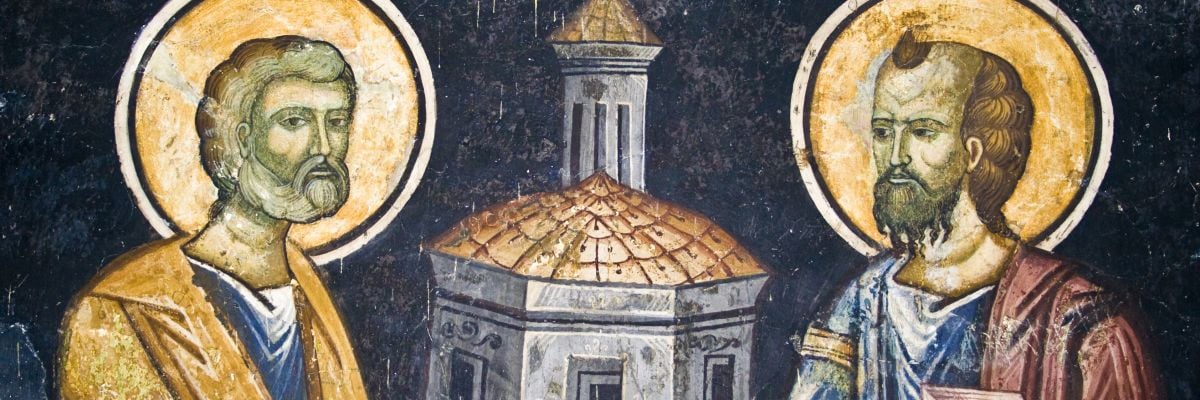
Some skeptics claim that the pagan culture of the Roman Empire heavily influenced the early Christian community—that the entire Christian system of belief was cobbled together by cherry-picking teachings from the “competing” religions of the time. A variant of this claim popular among non-Catholic Christians is that the Church started by Jesus Christ remained pure at first but then slowly adopted pagan beliefs, especially during and after the time of Emperor Constantine in the early fourth century.
These claims could not be further from the truth. The predominant pagan belief in the Roman Empire ran contrary to the Christian message, and the writings of the early Christians demonstrate an almost contemptuous view of pagan polytheism and idolatry. Also, it’s a historical fact that the Romans outlawed Christianity to varying degrees up to the time of Constantine.
The Early Christians’ Disdain for Pagan Beliefs
We know that the early Christians had no interest in emulating the beliefs of contemporary religions by the way they wrote about them. From these writings, it is abundantly clear that they found the practices of these religions abhorrent. While there are mountains of examples that can be given to illustrate this point, we’ll concentrate on just a few.
Other than the name attributed to The Epistle of Mathetes to Diognetus, not much is known about the author. The earliest estimate of the date of composition based on textual evidence places it some time in the first half of the second century. On the usefulness of pagan worship, Mathetes has this to say:
[T]ake a good look—with your intelligence, not just with your eyes—at the forms and substances of those objects which you call gods and hold to be divine. . . . Was not one made by a stonecutter, another by a brass founder, a third by a silversmith, a fourth by a potter? And up to the present moment when the skill of those craftsmen gave them their present forms, was it not just as practicable—indeed, is it not just as practicable even now—for every one of them to have been made into something quite different? Moreover, supposing that ordinary pots and pans of similar material were put into the hands of those craftsmen, could they not be turned into gods like these?. . . Do you really call these things god and really do service to them? Yes, indeed you do; you worship them—and you end up becoming like them. Is it not because we Christians refuse to acknowledge their divinity that you dislike us so?
The belief that the pagans worshiped lifeless works of art was common among the earliest Christian apologists. St. Athanasius, in his refutation of pagan beliefs Against the Heathen, criticizes the pagans for not considering that what they were worshiping were not actually gods but “the carver’s art.”
The Christians’ refusal to accept the beliefs and mode of worship of the Roman pagans led to another charge against them: atheism. In his second-century work First Apology, St. Justin Martyr explains:
So we are called atheists. Well, we do indeed proclaim ourselves atheists in respect to those whom you call gods, but not in regard to the Most True God, the Father of righteousness and temperance and the other virtues, who is without admixture of evil.
St. Justin admits that the Christians refuse to acknowledge the very existence of pagan gods, but his criticism of paganism does not end there. He goes on to distance the beliefs of Christians even further:
We do not reverence the same gods as you do, nor offer to the dead libations and the savour of fat, and crowns for their statues, and sacrifices. For you very well know that the same animals are with some esteemed gods, with others wild beasts, and with others sacrificial victims. And, secondly, because we— who, out of every race of men, used to worship Bacchus the son of Semele and Apollo the son of Latona . . . or some one or other of those who are called gods—have now, through Jesus Christ, learned to despise these, though we be threatened with death for it, and have dedicated ourselves to the unbegotten and impossible God; of whom we are persuaded that never was he goaded by lust of Antiope, or such other women, or of Ganymede, nor was rescued by that hundred-handed giant whose aid was obtained through Thetis, nor was anxious on this account that her son Achilles should destroy many of the Greeks because of his concubine Briseis. Those who believe these things we pity, and those who invented them we know to be devils.
Skeptics claim that other chapters of Justin’s First Apology admit to similarities between Christian and pagan beliefs, but this interpretation misunderstands the point he is making. He acknowledges that there are elements of truth in the philosophies of the pagans, but the fullness of the truth is not contained in any one of them. That fullness can be found, as Justin asserts, only in the Christian faith.
Roman Persecution and the Early Church Fathers
One of the tactics of Justin’s First Apology is to point out the inconsistency of the Roman rule of law regarding the Christians. For example, in chapter 21, Justin points out that the pagans believed Jupiter had many sons, whereas Christians believe Jesus is the son of the one true God. Yet only the Christians were persecuted for their beliefs.
Upon closer inspection of the historical record, I have found Justin’s parallels to be rather far-reaching. The story of Jesus has nothing in common with the stories of the so-called “sons of Jupiter,” for example. But the most important thing we can take away from the writings of Justin Martyr and other early Church Fathers is that the Christians believed pagan worship was demonic in nature and not to be emulated—even though to do so might have eased the Roman persecutions.
Post-Constantine Adoption of Paganism?
While atheist skeptics claim that paganism was part of Christianity from the beginning, some non-Catholic Christians claim that the real corruption began with Emperor Constantine around the year 325. But even though Christians of that era were more concerned with refuting heresies, in their writings we can find the same attitude toward pagan beliefs and practices that had been common among them in earlier centuries.
After Emperor Theodosius I did away with paganism, and the Visigoths seized Rome in 410, an idea began to circulate among the people that the old gods had taken better care of them than the Christian God. This inspired St. Augustine to pen his classic The City of God against the pagans. This is perhaps the best example of an all-out refutation from this time period.
Conclusion
All of this evidence taken together presents a strong case. If we are to believe that paganism had as great an influence on Christianity as some claim, we must also believe that the early Church Fathers—all of who faced the possibility of capital punishment for their beliefs—spoke out against the Roman cults while at the same time being secretly devoted to them.
If you are interested in learning more about the first centuries of the Christian Church, I highly recommend Timeless: A History of the Catholic Church by historian Steve Weidenkopf. Click here to purchase a copy.



